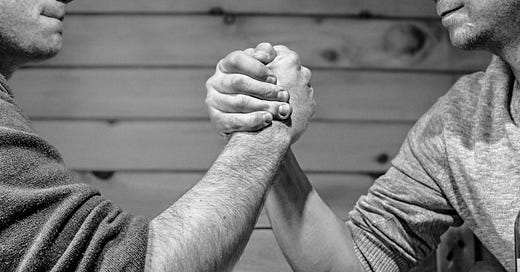The Courage to Be Gentle: Redefining Strength for Our Sons
When bulldozer men lead our country, what are we teaching our children about power?
Bulldozers aren't born—they're made. And I refuse to raise one. The other day, I shared an Instagram story that resonated deeply with me. It highlighted how true masculinity embodies "courage, compassion, and the wisdom to see how love and inclusion create the bravery we desperately need right now." These words gave language to something I've been contemplating as I raise my two boys and my daughter in this complicated world.
When Bulldozers Become Role Models
I watch my sons navigate friendships with peers who admire what Prof. Galloway aptly calls "bulldozer masculinity"—that style that prizes dominance over connection, volume over listening, certainty over nuance. It's a model where showing respect is somehow perceived as weakness, while steamrolling others is celebrated as strength.
This terrifies me, not in a hypothetical way, but in that visceral way that makes a mother's heart clench at 2 a.m.
The "bulldozer" approach leaves casualties everywhere—quieter voices silenced, vulnerable people treated as weak rather than worthy of protection, different perspectives labeled as wrong rather than valued. I've watched children made to feel "less than" when they don't conform to these rigid expectations—when they show emotion, prioritize relationships, choose compassion over competition. This culture creates ripples of harm that fracture the very communities our children need to thrive.
Why This Persists
I wonder why this model of masculinity still holds such power. Perhaps it's partly the "hurt people hurt people" dynamic. Those who have felt powerless might find vicarious satisfaction in seeing someone wield power without restraint. There's something seductive about watching someone say whatever they want when you've felt silenced.
And then there's the appeal of certainty in uncertain times. These bulldozer figures rarely express doubt. They speak in absolutes and present complex issues as simple battles with clear enemies. In a chaotic world, that kind of certainty—even when it's more performance than substance—can feel like solid ground.
I see this at home sometimes. When my teenager feels vulnerable or confused, the attraction to simplistic, aggressive posturing grows stronger. It's exactly when our children need us to show them a different way—to demonstrate that real strength can hold space for uncertainty, that courage often looks like saying "I don't know" or "I was wrong."
Leadership: The Models Our Children See
What weighs most heavily on my heart is watching my children absorb leadership models from positions of power—particularly the presidency. There's a strain of toxic masculinity normalized at the highest levels, elevating brashness over thoughtfulness, division over unity, self-interest over service. The message absorbed is devastating: Why listen? Why care? Why practice empathy when those who reject these values are rewarded with power?
I watch with worry as my sons observe men in leadership who degrade women, dismiss minorities, regard those on the fringes with contempt. These leaders approach governance with an "I do what I want" attitude, making chaotic decisions and treating every issue like a battle rather than a challenge to solve together.
What's missing—glaringly absent—is character. Integrity. Being a person of your word. And perhaps most powerfully: tenderness.
I find myself longing for the leadership model of Barack Obama, whose strength was evident not in bluster but in measured thoughtfulness. I look to figures like Cory Booker, who exemplifies courage through connection rather than dominance. They remind us that true strength isn't manifested through fear, but through empathetic conviction and genuine care for others.
What True Strength Looks Like
What I'm trying to teach my children—both my sons and daughter—is that real strength has never been about domination. It's about protection. It's about having the courage to stand for what's right even when it's difficult. It's about the vulnerability required to truly connect with others.
True strength manifests in countless ways—the fortitude to face injustice, the steadfastness to keep promises, the resilience to weather hardship without becoming hardened. But perhaps most importantly, it's the courage to be gentle in a world that often mistakes gentleness for weakness.
I want my sons to see that there's profound power in speaking softly while standing firm, in listening deeply rather than shouting down, in protecting rather than overpowering. I want my daughter to recognize these same qualities as expressions of strength she can embody—not as passive virtues but as active forces that change the world around them.
The Daily Work of Transformation
In the quiet after bedtime, I often wonder if I'm getting any of this right. There's no manual for raising children who can see beyond limiting stereotypes while developing secure identities. I'm navigating by starlight, making adjustments as the horizon shifts.
But then I see my youngest son comfort a friend instead of telling him to "toughen up." I watch my teenager stand beside someone being excluded. I hear my daughter speak her mind without diminishing herself. And I think perhaps we're finding our way toward something better—a world where strength isn't about domination but protection, not about rigidity but resilience.
In this moment we're living through, redefining what strength means feels more essential than ever. It starts at home, in thousands of seemingly small moments that are actually shaping everything that matters.





This may be the most important essay you’ve ever written.
I think about this All. The. Time. For a moment, I felt like we as a country were making progress in this area to now have the exact opposite in our faces seemingly every hour of the day. Having honest, open conversations, leading by example, and guiding his heart and mind the best we know how...it starts at home.